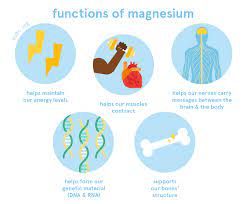Importance of magnesium in human body:
Importance of magnesium in human body:
Introduction:
As we know that all minerals are required for proper functioning of body. As it magnesium is also important in body. In this article I will discuss about, How Magnesium is important in our body?, Deficiency of magnesium, Sources of magnesium, Recommendations of magnesium, Supplementation of magnesium and Side effects of excessive intake of magnesium. So if you want to know completely about magnesium role in our body, then read this article till end.
And if you want to know more about importance of minerals, then click on this article:
How Magnesium is important in our body?
Magnesium is an important in mineral in our body. It is important for the brain functioning. It is 4th most abundant element in our body. It is also important in enzymatic reactions. It is used for the protein synthesis and DNA replication. It is involved in the transmission of nerve impulses. Some other most important functions of magnesium in our body are given below:
Enzymatic Biochemical reactions:
According to some studies magnesium is involved in hundreds of enzymatic reactions in our body. There are about more 700 reactions in body in which magnesium is involved. Such as, It is involved in muscle movement, DNA and RNA formation, protein formation etc.
Activation role:
It is responsible for the activation of Vitamin D and gives strength to bones. It is involved in the assimilation of calcium in bones.
Metabolism of Carbohydrate:
Magnesium has also a function to metabolize carbohydrate. They convert carbohydrates into glucose.
In Sports Nutrition:
Magnesium is involved in the enhancement of stamina. According to some studies it will bind sugar with muscles after exercise.
Brain Functions:
Magnesium is also involved in the proper brain functioning. It is used to reduce depression. According to a research magnesium affects directly our brain. Low level of magnesium in body may high depression rate.
For proper heart beat:
Magnesium is also having a function to make relaxation of cell in hear during contraction.
Deficiency of magnesium:
It may common in old adult age, but in childhood and adult age, chances of magnesium deficiency are rare. Its deficiency cause many dysfunctions in our body. Most of them are given below:
Fatigue:
Due to the deficiency of magnesium, Enzymatic reaction slows down that’s result is fatigue and weakness.
Muscle cramp:
It is a disease that is caused by the deficiency of magnesium.
Heart and brain diseases:
Due to the deficiency of magnesium a patient may suffer from change in blood pressure. Low level of magnesium may cause depression and restriction in movement of nerve impulses.
Nausea and Vomiting:
In some cases deficiency of magnesium may leads to nausea and vomiting, sometime it also cause headache.
So, reduce the chances we should intake in our diet.
Low calcium and potassium level:
It is involved in the low calcium and low potassium level. When the level of magnesium decreases, then level of calcium and potassium also decrease in our body. These are directly proportion to each other.
Sources of magnesium:
Magnesium should be used in our common diet as a fortification. Generally it is found in Legumes, Seeds, Nuts, Green leafy vegetables and in whole grains. Some important sources of magnesium are given below:
Spinach
Almond
Broccoli
Whole grains especially wheat
Brown rice
Banana
Kidney beans
Recommendations of magnesium:
Recommendation for magnesium is vary according to age. So, daily dose of magnesium according to NIH is given below:
Infant dose:
In infant almost 80 mg magnesium should be included in diet.
Child dose:
In child 80 – 225 mg per day is recommendation of magnesium.
Dose for Adults
410 - 420 mg magnesium is recommended for adult women and men.
Dose for females
Amount of magnesium in females is generally lower than males.
Dose in pregnancy
In pregnancy amount of magnesium should be 350 to 420 mg per day
Supplementation of magnesium:
Magnesium supplements should be used but always in the form of fortification. But dieticians always recommended that we should fulfill our nutritional needs with food instead of supplementations.
Side effects of excessive intake of magnesium:
Conclusion:
At the end in the light of above discussion we can say that magnesium is an important element for proper functioning of brain and body.













No comments